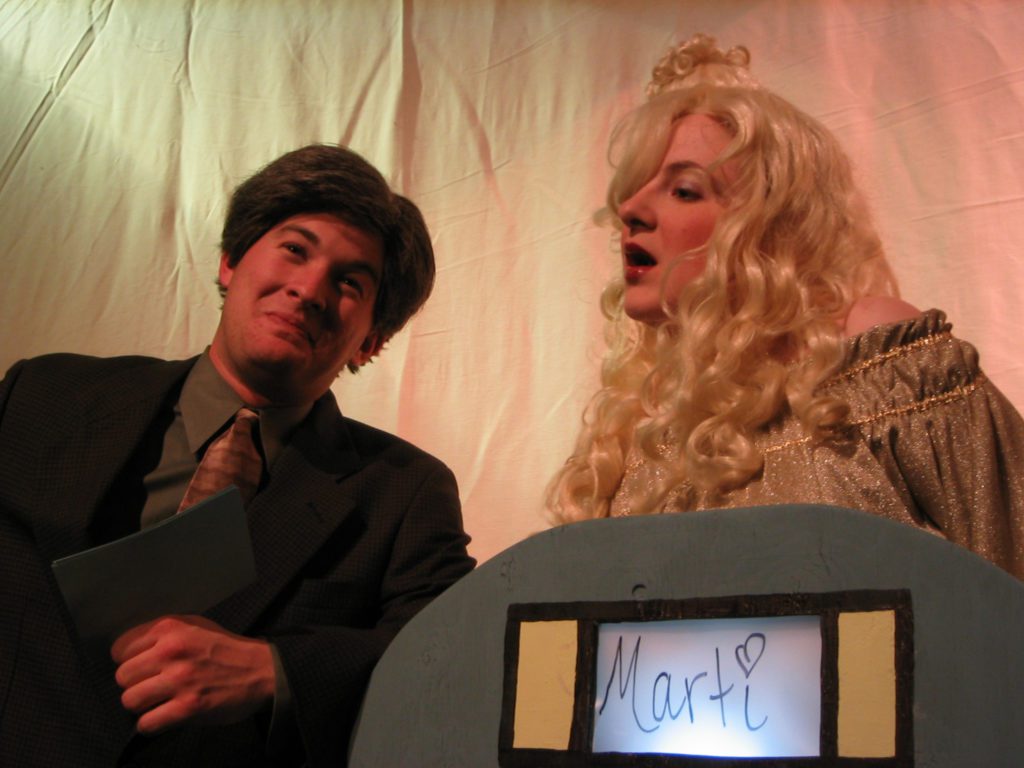The busy Buntport Theater Company, which is to rest what adult companionship is to Michael Jackson, is parking it on the couch this December for a brief series of comic parodies targeting all things television.
The Buntporters are calling “Idiot Box” their first foray into sketch comedy, but aficionados of their biweekly original book-club sitcom, “Magnets on the Fridge,” will quickly recognize its irreverent style and sensibility.
Though there may not be a subject more rife for Buntport’s sophisticated and intellectual brand of comedy than the vapidity of television, “Idiot Box” does not aspire to be much more than ticklish. This is neither high concept nor particularly biting social commentary. It’s just, for the most part, very funny.
And not surprisingly, it is executed at a level of exactness, characterization and timing that betters most companies around town who do sketch comedy for a living.
During a stretch when Buntport will open its 12th and 13th original mainstage productions within three weeks, and while still cranking out its midweek “Magnets” episodes to a stunning standard of originality, it’s frankly a bit of a relief to see Denver’s hardest-working theater company unburden themselves of the need to be so darned relevant all the time.
“Idiot Box” plays on the fact that most of us only have vague notions of the way televisions actually work. It opens with an unseen conversation between some kid (Andy Vickory) rattling off his blah blah scientific theories about electron beams and cathode rays, and an adult(-like) Evan Weissman, who sets his precocious counterpart straight: Actually, young Andy, tiny fairies are trapped inside our television sets and are forced to act out whatever show is playing on the selected channel.
That’s how televisions really work, Andy. Cathodes. Hah.
Our five bickering and sardonic fairies operate on a stage framed by the simple outline of an old fashioned television set. When these proletariat pixies interact behind a silhouette that represents the television screen itself, we get to know their off-camera personalities. When they are in front of the silhouette, they are considered on-duty, and subject to the channel-changing whims of their unseen despotic couch potato.
Among the easy targets are buddy-cop shows, soap operas, the Food Network, inane game shows, vapid local newscasts, the strange preponderance of Australian outdoorsmen on American television and, most especially, the emerging genre of “Mean TV,” with all its subhuman reality genres including cruel coupling contests and demeaning prank shows.
Among the less-obvious gems are Erik Edborg performing “Cooking With Stalin,” a cooking show for dictators. “Remember what Lenin says,” we are told, “You can’t make an omelet without breaking a few hundred people.”
The incomparable highlight is the triumphant return of young Mitchell and Stacey Petrovsky, Buntport’s longest-running and most revered characters (played by Brian Colonna and the queen of comedy, Erin Rollman. Bow before her.).
For three years, the Buntport’s signature traveling sketch has been Mitchell and Stacey’s riotous foray into Girl Scout-cookie capitalism, which featured a diabolical pre-teen Stacey domineering her braided and brown-skirted younger brother in her pursuit of the local cookie-selling crown. Here, maniacal Stacey is being interviewed on the local news about her science fair invention, “Monopolize Your Risk,” a board game of “capitalistic skill and global domination.”
Television presents such a target-rich environment that by the evening’s short (70 minutes) end, one wonders how topics such as infomercials, sports, humiliating talk-show revelations and Paris Hilton escaped unscathed.
Given more time and energy, you might expect to see more multimedia touches from Buntport and some sort of social commentary beyond Hannah Duggan’s prescient observation that most of us like to watch others humiliate themselves on TV “just so we can feel patently superior to them.”
After all, the evolution from “The Dating Game” to “Average Joe” is as apparent as the bloodlines linking “Candid Camera” to “Punk’d.”
But while some parodies such as the situational game show “Blame It On” are standard stuff, Buntport on a day off is still vastly superior to any banal collection of “Saturday Night Live” sketches.
In small ways, “Idiot Box” manages to accomplish what Buntport always has been known for. It manages to stretch the sketch-comedy form like those poor fairies’ multicolored, skin-tight Lycra costumes.
-John Moore, December 19, 2003, Denver Post
